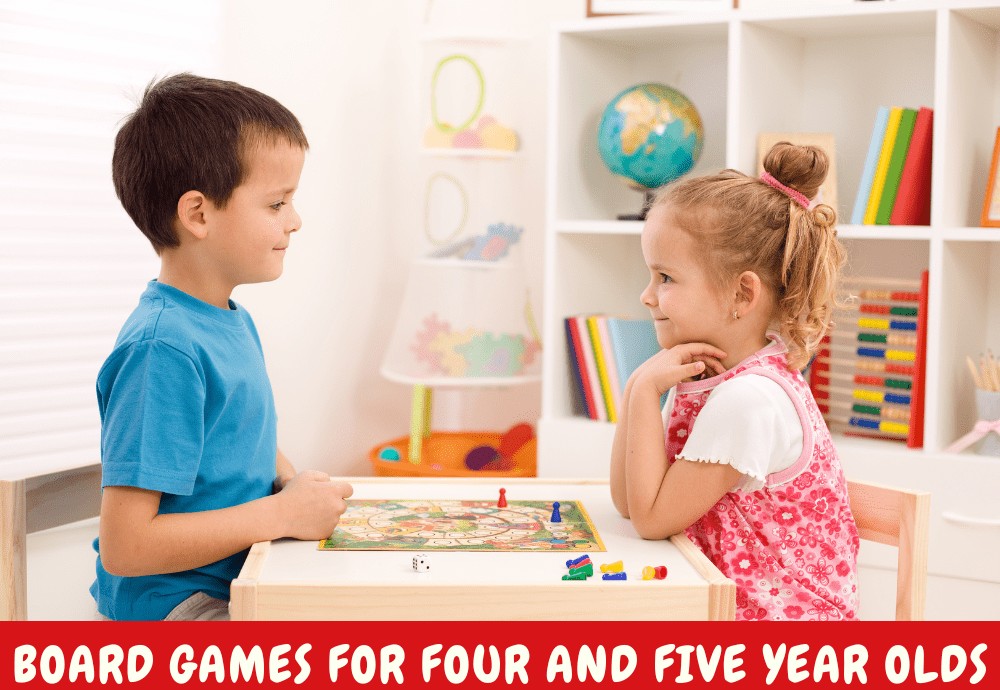Board Games are a great family activity and offer children the opportunity to learn, play and engage in family fun all in one activity. You can support your child’s development and skill acquisition through family time spent playing board games together during a family game night.
As children grow up they require activities that will engage them as toys can become boring so board games are a great way to engage the curious child in using their brain while having fun! Board games are known to improve cognitive, fine motor and social skills such as sharing and turn taking. Some board games for 4 year olds are collaborative while some are competitive so its important to know the child you will be playing the game with when deciding.
Now my husband and I have been board game lovers for years, so much so that our wedding was even board game themed as each table had a picture of us playing a different board game over the years. A couple years ago I created the Board Game Guide for Couples, and I am thrilled to be able to identify the Best Board Games for 4 Year olds, as our daughter is finally old enough to play board games with us!
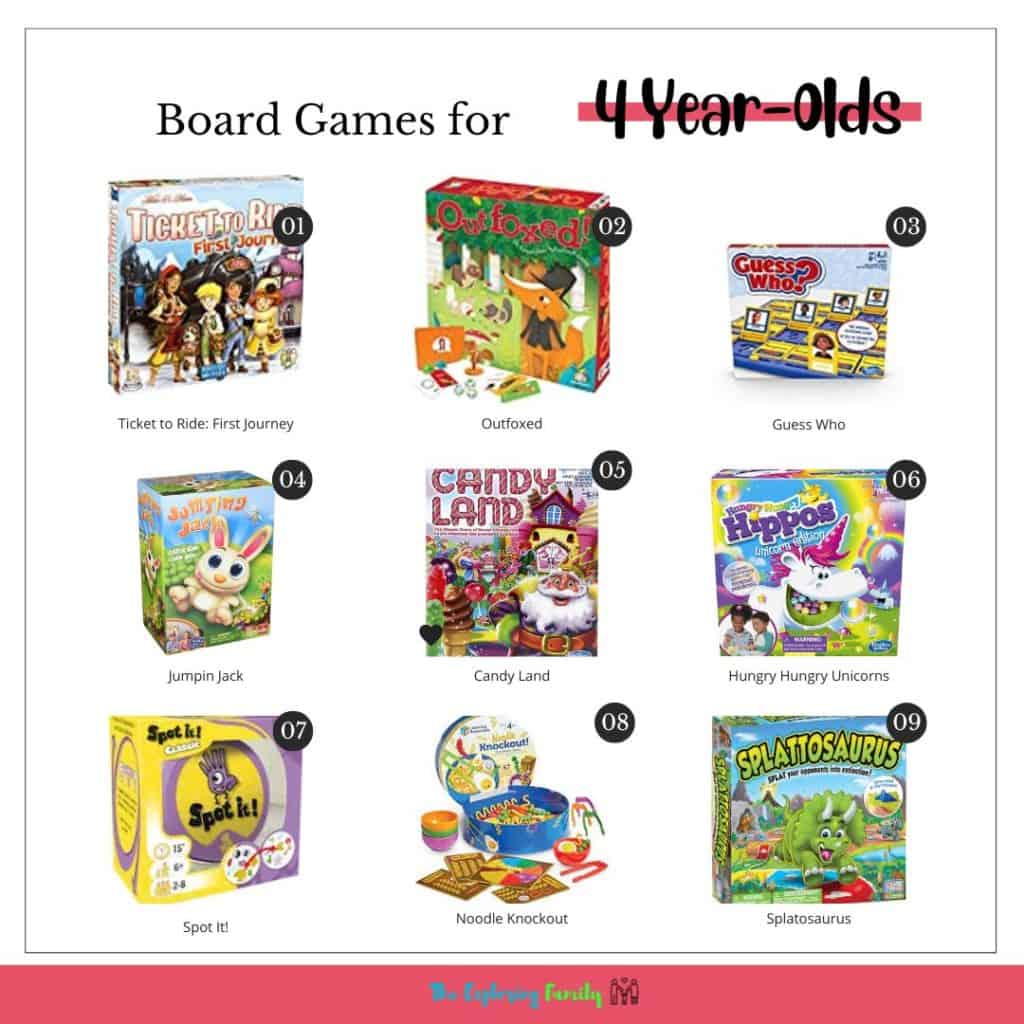
What Age Can Children Start Playing Board Games?
Every board game identifies a minimum age such as 3+ or 4+ however I find young children develop skills as different rates so depending on your child’s development they may be able to engage with these board games earlier. Kids are all different so I use my own personal judgement when deciding what games to play with my daughter.
My daughter easily picks up skills and is very math and strategy orientated so she loves board games as much as we do and often learns them very quickly. The best toddler and preschool board games may be too easy for your child so you may consider board games from a higher age group, however they may also be the perfect fit for your family.
The best way to try out board games is to visit a local board game cafe. Children develop new skills daily, so if a board game is not successful the first time, revisit it in a couple of months as your child may be more ready for that board game. Trying out new games as a family is the best part of selecting new board games as it allows you to spend quality time as a family.
Therefore I have created this list of the Best Board Games for 4-year olds that are perfect for a birthday party gift, or Christmas gift and can easily be found in the game aisle in any local board game store or can be purchased on Amazon.
What Makes a Good Board Game for a 4 Year Old?
When selecting board games for our daughter I look for the following benefits of board games:
Length of Game Play: Four year olds have a limited attention so I try to aim for games that are between 15 and 30 minutes. Start with simpler games and work your way up to games that are more challenging and require more strategy.
Skills being taught: Board Games are a great way for children to practice educational game skills such as counting, matching, critical thinking, cooperative play, color recognition, pattern recognition, shapes, memory skills, fine motor skills and many more others.
Number of Players: We like to play games as a whole family, so we prefer games that are designed for more than 2 people so we can play together.
Best Board Games for 4 Year Olds
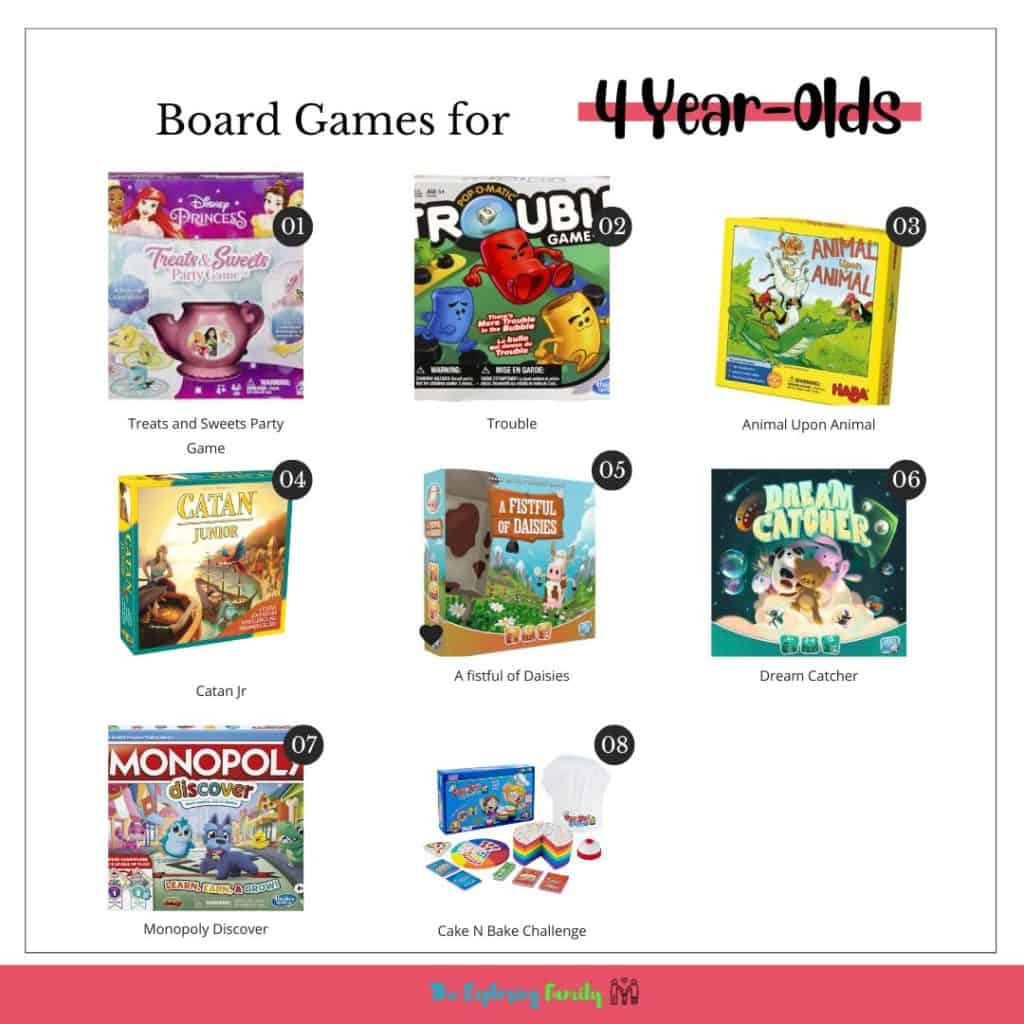
*The following are all board games that I have played with my 4 year old during the last year.
1.Monopoly Discover

Skills taught: counting, matching, reading, basic math skills
Number of Players: 2-4
Minimum Age: 4+
Pros:
– Two levels of play: matching and counting, or turn it over to enjoy a harder version with reading and basic math skills
– Fast, fun and exciting
– Simplified money
– Adorable Tokens: Kids will love using the Monopoly tokens: Penguin, Car, Ducky, Scottie, Hazel, and Rex
– Bilingual
2. Outfoxed

Playtime: 20 minutes
Skills taught: strategy, detective skills, observation
Number of Players: 2-4
Minimum Age: 5+
Outfoxed allows players to work together in this cooperative game where players gather clues to determine who the suspect is in this collaborative Whodunit game. Will you halt the hungry hooligan before it flies the coop or will you be Outfoxed?
Pros:
– Collaborative
– Engaging and Fun
– Cute characters
Cons:
– Multiple different things happening at the same time can be confusing as you need to collect clues and move the fox at the same time
3. Guess Who

Playtime: 30 minutes
Skills taught: strategy, detective skills, observation
Number of Players: 2-4
Minimum Age: 6+
Use Your deductive question skills in this two player game to determine which player each person choose by eliminating characters based on responses from your opponent.
Pros:
– Interactive
– Practices communication skills through questioning
Cons:
– Requires patience in between turns
4. Jumping Jack

Skills taught: reflexes, hand-eye coordination, cognitive skills
Number of Players: 2-4 players
Minimum Age: 4+
A simple game to play, as kids spin to see how many carrots to pull, when suddenly the rabbit will pop. Catch the Rabbit to WIN! This is the perfect game for younger kids just starting to play games.
Pros:
-Engaging
– Build quick relexes
Cons:
– Very simple for older kids
5. Candy Land

Skills taught: colour recognition, number recognition, turn taking, matching
Number of Players: 2-4 players
Minimum Age: 3+
Do your remember playing this classic beginner board game? Teach future generations how to race to the castle while stopping at the delicious surprises along the way.
Pros:
– Fun Game for little ones
– Quick game play
– No Reading required
– Engaging Colours
– Great beginner game
Cons:
– Very easy, can become boring after repeated play
6. Hungry Hungry Hippos

Skills taught: fine motor skills, coordination
Number of Players: 2-4 players
Minimum Age: 4+
Try your luck at this fast paced game on this twist of the traditional board game as it features new launchers motorized.
Pros:
– Perfect for little hands
– Quick game play
– No Reading required
– Fun characters
Cons:
– Very easy, can become boring after repeated play
– Includes small pieces (marbles)
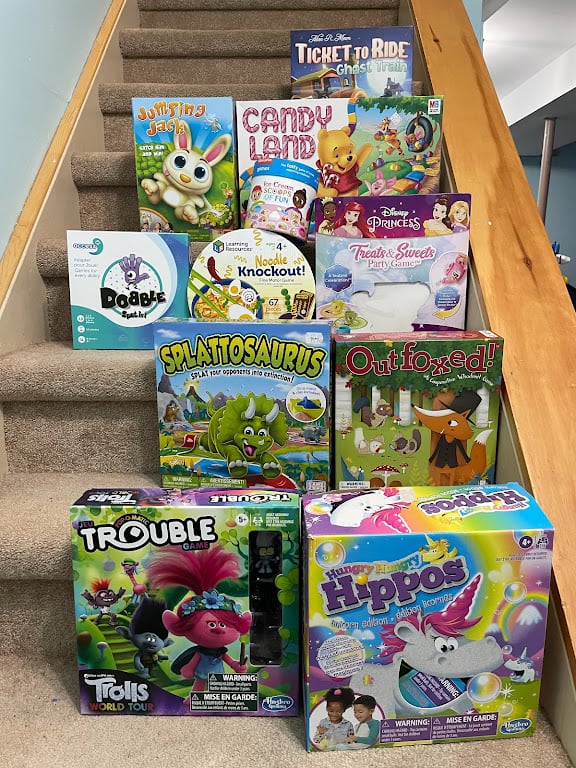
7. Spot It!

Skills taught: observation, reflexes, matching focus, visual perception skills, speech-language skills, and fine motor skills.
Number of Players: 2-8
Minimum Age: 6+
Test your observational skills in this fast paced game that tests your reflexes!
Pros:
– Easy to learn
– Quick to teach
– Endless gameplay
– Five challenging ways to play
Cons:
– Could be more durable for little hands
– Small images, though they have created a new version with bigger images called Spot it Dobble
8. Noodle Knock Out

Skills taught: fine motor skills, counting, colours
Number of Players: 1-4
Minimum Age: 4+
Test your fine motor skills as you try to collect each item to fil your menu using chopstick tongs.
Pros:
– Easy to learn
– Quick to teach
– Durable pieces
– Colourful artwork on menu cards
– Multiple ways to play
– Solo or group play
Cons:
– Lots of pieces
9. Splatosaurus

Skills taught: strategy, colour matching, counting, dexterity
Number of Players: 4
Minimum Age: 4+
Race to get all your baby dinosaurs home, but watch out or you may get SPLATTED!
Pros:
– Fun to create dinosaur play pieces using playdoh and a mold
– Engaging dinosaur theme
– Simple rules to follow
Cons:
– Requires playdough to be replaced after sometime
– Can be messy
– Can take a long time to play
10. Treats and Sweets Party Game

Skills taught: observation, matching focus, counting
Number of Players: 4
Minimum Age: 4+
Your invited to the princess tea party where you will use your observation skills to collect matches.
Pros:
– Fun princess theme
– Engaging Tea pot dice roller
– Bright colours on baked good cards
– Simple rules to follow
Cons:
– Time consuming
– Lots of little pieces
– Awkward to store
11. Trouble

Skills taught: counting, subitizing
Number of Players: 2-4
Minimum Age: 4+
Race to be the first to get all four of your playing pieces home!
Pros:
– Fun popper dice
– Engaging game play
– Simple rules to follow
Cons:
– Long game play
– Repetitive
– Non reusable box
12. Animal upon Animal
Skills taught: strategy, fine motor skills, turn taking
Number of Players: 2-4
Minimum Age: 4+
Can you stack your pieces before your opponent or will you be the one to knock over the tower? Only time will tell!
Pros:
– Small and easy to travel with
– Durable quality materials used
– Independent Play or Group Play
– Easy to repack and store
Cons:
– Small pieces
13. Catan Jr.

Skills taught: strategy, subitizing dice, turn taking
Number of Players:
Minimum Age: 6+ Independently, 4+ with assistance
Simplified building rules, child-oriented trading, and a equivalent called the “Ghost Captain” provide access to the world of CATAN games.
Pros:
– Builds growth mindset
– Engaging pirate theme
– Well produced and durable
Cons:
– Can be a little complicated and is aimed for 6+ but I think can be played with a mature 4 year old who has experienced other games.
You can Purchase here: 401 Games
14. A fistful of daisies
Skills taught: strategy, subitizing dice, turn taking, matching
Number of Players: 2-4 players
Minimum Age: 4+
Cows fight one and another to collect the succulent flowers needed to win!
Pros:
– 15-30 minute gameplay
– Fun farming theme
– Game box is part of the playing area
– Encourages children to focus and pay attention
Cons:
– Can get competitive during battles

15. Dream Catcher
Skills taught: observation and cooperation
Number of Players: 2-4
Minimum Age: 4+
Dive into your dreams and on each your turns, choose the right cuddly toy to fully cover the nightmare’s shape. But observe closely because the smaller your cuddly toy is, the more it will bring you Dream tokens to fill your cloud!
Pros:
– Cooperative
– Beautiful artwork
– Simple game play – limited action choices
– Interesting enough to replay
Cons:
– Rolling a dice for monsters seems unneeded

16.
- Ticket To Ride First Train

Playtime: 30 minutes
Skills taught: counting, colour matching
Number of Players: 2-4
Minimum Age: 6+
Based off of the Original Ticket to Ride, First Journey allows children to join the game in a simpler way as they collect train cards, claim routes and connect cities all on a small board. Climb aboard, young travelers, your First Journey awaits!
Pros:
– Longer game play (30 minutes)
– Multi Player
– Engaging theme
– Durable
Cons:
– Can be a little complicated
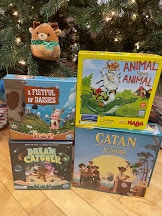
Disclosure: We were provided with samples of some of the games included, however our opinions remain our own.

